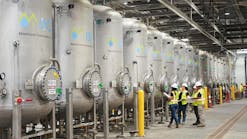The Maryland Board of Public Works (BPW) has approved more than $22 million in loans and grants to WSSC Water to help Maryland’s largest water utility continue efforts to protect local waterways and the Chesapeake Bay.
The funds include an estimated $15 million loan for WSSC Water’s Piscataway Bioenergy Project and $7.7 million in Bay Restoration Fund grants for the utility’s Sewer Reconstruction Program.
Piscataway Bioenergy Project
The estimated $15 million loan will help fund the ongoing design and construction of WSSC Water’s Piscataway Bioenergy facility in Accokeek, Md., in Prince George’s County. Currently, WSSC Water’s five major water resource recovery facilities produce about 8,000 tons of biosolids each month.
Through innovative technology, the amount of biosolids left over from the treatment process will be significantly reduced and cleaner (Class A). The process used to create these Class A biosolids will generate methane gas, which will be captured and upgraded to renewable natural gas (RNG) that WSSC Water will sell on the open market. Selling RNG will generate Renewable Fuel Credits, which can be sold to generate additional revenue for WSSC Water. Construction on the $271 million project began in spring 2019 and is expected to be substantially complete by November 2024.
“The Piscataway Bioenergy Project is about renewable energy, sustainability, and reducing greenhouse gas emissions,” said WSSC Water General Manager and CEO Carla A. Reid.
Sewer Reconstruction Program
The Bay Restoration Fund Grants, totaling an estimated $7,747,811, will help fund WSSC Water’s Sewer Reconstruction Program. The comprehensive program replaces and rehabilitates pipes and manholes in areas where sewer mains leak, have become damaged, or have reached the end of their useful life.
Specifically, the funds will target infrastructure improvements in the following sewer basins in Prince George’s County: Beaverdam, Northwest, Parkway, and Piscataway. They are four of 25 major sewer basins in the WSSC Water service area. The grants will help fund work that began in summer 2020.
“Repairing and upgrading our aging sewer infrastructure is part of our ongoing efforts to protect public health and the environment,” added Reid. “We thank BPW members for their leadership in approving these funds and appreciate the Maryland Department of the Environment’s support of our strategic investments in a cleaner, greener future.”



